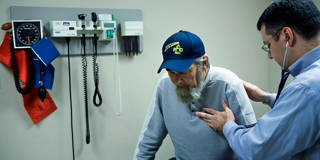How Would Health-Care Reform Affect Patient Health?
The US Congressional Budget Office has estimated that some 32 million people would lose their formal insurance coverage in the next decade under the various proposals to replace "Obamacare." But it is important to understand just what that would mean in practice, and how much it would actually affect health outcomes.
CAMBRIDGE – Health-care reform is the major policy issue commanding attention in the United States. A crucial feature of the debate is the official estimate of the number of individuals who would lose their health insurance under the various plans that have been proposed to repeal and replace the existing Affordable Care Act (better known as “Obamacare”).
The prospect that repealing Obamacare would cause more than 20 million people to lose their formal insurance coverage, as the Congressional Budget Office has estimated, is understandably a serious barrier to legislative progress. It is important, therefore, to understand just what that would mean in practice, and how much it would actually affect the health of those who lose their formal insurance.
The primary reason for the loss of insurance in the proposals to repeal and replace Obamacare is the projected decline in Medicaid coverage. Medicaid is the joint federal-state health-care program in which the federal government defines who is eligible, stipulates which benefits must be provided, and finances those benefits based on a formula whereby states with low average incomes receive a larger share of federal funding.



CAMBRIDGE – Health-care reform is the major policy issue commanding attention in the United States. A crucial feature of the debate is the official estimate of the number of individuals who would lose their health insurance under the various plans that have been proposed to repeal and replace the existing Affordable Care Act (better known as “Obamacare”).
The prospect that repealing Obamacare would cause more than 20 million people to lose their formal insurance coverage, as the Congressional Budget Office has estimated, is understandably a serious barrier to legislative progress. It is important, therefore, to understand just what that would mean in practice, and how much it would actually affect the health of those who lose their formal insurance.
The primary reason for the loss of insurance in the proposals to repeal and replace Obamacare is the projected decline in Medicaid coverage. Medicaid is the joint federal-state health-care program in which the federal government defines who is eligible, stipulates which benefits must be provided, and finances those benefits based on a formula whereby states with low average incomes receive a larger share of federal funding.